The Priceless Cats
This is an Italian version of the 12th-century British folk tale, “Dick Whittington and His Cat”, with a somewhat different ending.
Among the ancient Romans there was a proverb that those who are greedy never have enough, and since the Romans were Italians, the proverb still holds true. In the golden city of Venice they tell a tale that proves this time-old saying.
There once lived in the city by the sea two merchants who were neighbors. Both were rich. Both had grand palaces on the green, shimmering canal, with proud gondolas tied to cinnabar-and-yellow-striped poles. And both had lovely young children who were friendly and played with one another. As for the merchants, one was as different from the other as a black pebble from a shining ruby. One was hard and sharp and greedy, wanting whatever he saw, whether he needed it or not, while the other was generous and good, working to help not only himself but others as well. The two merchants knew each other and spoke to each other, but when it came to business, Mr. Greedy-Wolf was wary and watchful, not trusting anyone, not even himself
So time went by, with these two buying and selling, working and growing. There came a day when Giovanni, the good merchant, set out on a far journey to trade for spices, which were much sought after in Europe then. He loaded his vessels with toys and corals and silks and beautiful glassware to exchange for pepper and cinnamon and vanilla and curries and other scented spices that grew on the islands far away.
Don Giovanni sailed for days and weeks and then came to the rich East, where he traded from island to island, with benefit to himself and satisfaction to the islanders. One sparkling morning he came to a harbor that was as still as a graveyard, with masts hanging like tombstones. The streets and the markets were quiet as the night.
The merchant and some of his men walked about, disturbed only by their own footsteps. Where were the hustling and bustling townspeople dressed in colorful clothes? Where were the smells of spices and the cries of vendors that usually filled the air of a busy city? Finally the traders from Venice met two men who took them before the King. The ruler sat on his throne with a sorrowful face and head bowed low. Courtiers stood around, no different from the King.
“Can we trade with your people, Your Majesty?” the Venetian merchant said. “We have rich goods from our land that we would gladly exchange for spices.”
“Master merchant,” said the ruler, “our spices are ravaged, our grain is destroyed, our food is ruined. It is a wonder we are alive, because of the terrible plague that has come over our land. Everything is slowly being destroyed – even our clothes.”
“And what is this terrible plague that has brought your land such unhappiness, Your Majesty?”
“Gnawing rats and scuttling mice! They are in our homes and clothes and in our fields and roads. We have set traps for them and we have strewn poison in the pantries, but that has done more harm to our animals than to our pests. There seems to be no remedy for this curse.”
“Have you no cats?” the merchant asked.
“Cats? What are cats?”
“Why, cats are furry little animals like small dogs, and they are the mortal enemies of mice and rats, destroying them wherever they find them!”
“Where can I find these cats?” the King cried. “I’ll pay anything for them!”
“Your Majesty,” Don Giovanni said, “you do not have to pay for cats. We have many of them on our ship, and I will gladly give you a present of some; I am certain your pests will soon be gone.”
The King thanked the merchant, almost with tears in his eyes, and within an hour the merchant brought two fine cats; one, a black Tom as fierce as he was big, and the other a lovely tiger-striped lady cat who was famous for having many kittens and catching even more mice. The King and the islanders looked with awe and wonder at the two animals, for they had never seen cats before, and when they saw them set to work at once on the mice and rats, they were so overjoyed that they wanted to sing and dance.
The King was grateful from the bottom of his heart and wanted to prove this to the merchant, so he showered him and his crew with bales of spices and gleaming jewels, with sweet-smelling sandalwood and carved ivory, beautiful as a song.
When the merchant and his crew sailed home, they were so happy and contented that even the wind and waves knew it and led their vessel swiftly back to Venice. And the joy of Don Giovanni’s family was great when he reached home, and great was the excitement of his fellow merchants of Venice when they saw his royal cargo.
Don Giovanni met Don Cesare, his neighbour, before the golden church of San Marco, that treasury of beauty in the world. They spoke of this and that, about the journey and the trading, and then Don Giovanni told Don Cesare how he had traded the richest merchandise of all for just a pair of common cats. Don Cesare’s tongue nearly hung out with greed and envy when they parted. Thereafter, day and night, Don Cesare could think only of how Don Giovanni had gained a treasure by giving away two worthless cats that any Venetian would pay to get rid of. He had no peace, and he was more restless than a horse with a thorn in his side. Green jealousy and greed ate into him like fire in dry grass, until he could stand it no longer. He had to go to that island and bring back as big, if not a bigger, treasure than had Don Giovanni.
He fitted out a splendid ship filled with the best of goods, golden vessels, brocades, carved corals. With such gifts the generous King should give him twice – no, three times – as many riches as he had given Don Giovanni. Soon Don Cesare reached the island. He told the King he was a friend of Don Giovanni. The King received him with open arms, only too happy to welcome a friend of the man who, by his generous gift, had rid the island of the terrible pests.
Don Cesare told the King he, too, had brought him gifts – gifts much more valuable than those of Don Giovanni. Then he presented his gifts of golden cups and carved corals, rich brocades and gilded embroideries – the richest Venice could show to prove his friendship. Truly the emperor was overwhelmed by this show of unselfish generosity. He was a simple and an honest man, and appreciative as well, and he thought hard how he could repay the friendship shown by Don Cesare. Try as he would, he could think of nothing rich enough and fine enough. In the end he called together his counsellors to decide what to give to Don Cesare in return for the lavish presents, which, the King thought, Don Cesare had given out of the kindness of his heart.
Each elder had his say. In the end, one rich in wisdom arose and said, “Oh, King, this man from Venice has given to you and to us things that will be a joy to look at for years to come. Truly, we in our little island have no gifts to equal his. We could give him spices and perfumes and woods, but these are simple things growing freely in our land. They come and go every year. But there is one thing we possess now that is of great value in this world. . . .”
The King set a day for the great royal audience to present the merchant with his reward. All the counsellors came, and as many people as the room could hold, and then the merchant appeared before the King. He came with light steps and greedy thought, thinking of the riches he would reap now – riches that would surely be greater than those Don Giovanni had received. There were blowing of trumpets and beating of drums and many fol-de-rol speeches of friendship on the part of the merchant.
In the end the royal master said, “Don Cesare, you came to our land and gave me kindly gifts freely from the goodness of your heart. That is a fine thing for a man to do. And, as the saying goes, from seeds of goodness grow rich purple plums of goodness. I and my counsellors thought for a long time how to reward you properly for such unselfish generosity, and finally we decided on the most valuable gift we have.
“When my people and my land were in their greatest distress, a countryman of yours saved us by giving us a gift. It was a gift more precious than gold or diamonds or spices. We have been unable to think of anything more wonderful than the same gift for you. We know it will bring you the same joy and peace it has brought to us. Soldiers, bring the golden cage with the royal gift for Don Cesare!”
Then two soldiers came in with the golden cage in which two little kittens were playing in a way that was a joy to behold. The soldiers stopped with the cage before the merchant. The King smiled happily, as did the courtiers and the people. The merchant looked at the kittens, but he could not say a word, and when he saw everyone beaming and smiling at him, he had to smile, too – a smile that stretched from ear to ear. . . . Soon after he sailed homeward.
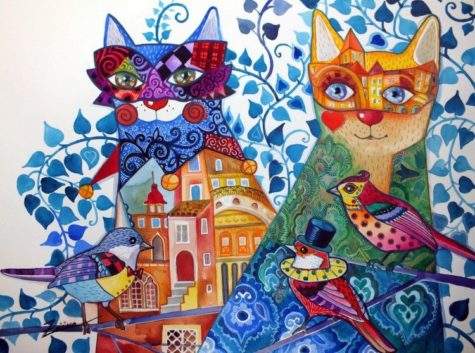

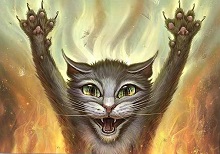

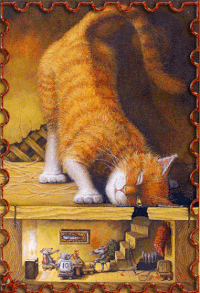
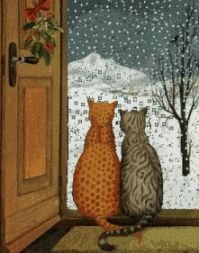

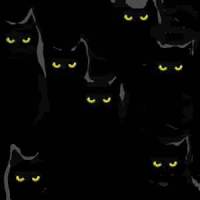
Leave a Reply